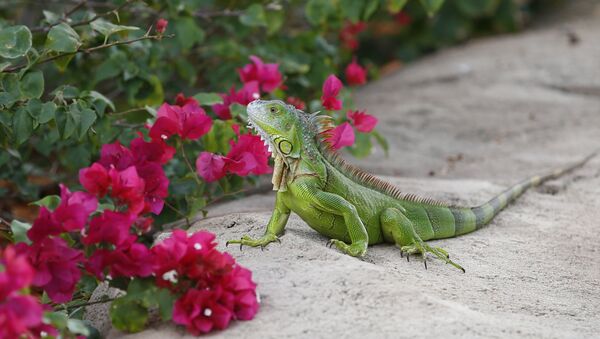Il fait à présent si froid en Floride, les températures étant plus basses que 5°C, que les iguanes commencent à tomber des arbres.
The iguanas have a good chance of thawing out if you move them in the sun. Just be careful @CBS12 pic.twitter.com/Qn2w6NFedD
— Maxine Bentzel (@MaxineBentzel) 4 января 2018 г.
Cette température suffit pour immobiliser les iguanes verts, très répandus dans les environs de Miami. Des photos de reptiles parsemant le sol sont devenues virales sur le Net.
The @pbpost had a piece today about cold-shocked iguanas falling from trees. Laughed it off until I was walking back to my @pbcsd office this afternoon! Watch out! 🦎 from above! #iguana #cold #floridawinter pic.twitter.com/iRVgTjNxlb
— Bryan Craig Sandala (@BCSandalaSDPBC) 4 января 2018 г.
One side effect of cold weather in South Florida: frozen iguanas. https://t.co/bJBotVibWt
— #NBC7 San Diego (@nbcsandiego) 5 января 2018 г.
(Thanks to Jenna Isola for the video) pic.twitter.com/BHDxMT1dIu
Les animaux poïkilothermes commencent à être apathiques lorsque le mercure passe en dessous des 10°C. S'il baisse encore, les iguanes se gèlent, selon des spécialistes.
Frozen Iguanas Falling From Trees as Temperatures Dropped below 40 In Parts of South Florida. #WinterStormGrayson pic.twitter.com/ILD3KZRl6F
— ~Marietta️ (@MDavisbot) 5 января 2018 г.
Il est déconseillé aux habitants d'emmener les animaux chez eux, car une fois réveillés, ils peuvent se sentir en danger et devenir agressifs. Même s'ils semblent être morts, ils ne font que dormir, avertissent les zoologistes.
The frozen iguana petrified next to my South Florida swimming pool yesterday, reanimated himself in the afternoon sun. Here he is walking it off… After another cold night, though, he's probably a green popsicle again this morning. pic.twitter.com/nOept7ksJT
— Frank Cerabino (@FranklyFlorida) 5 января 2018 г.

